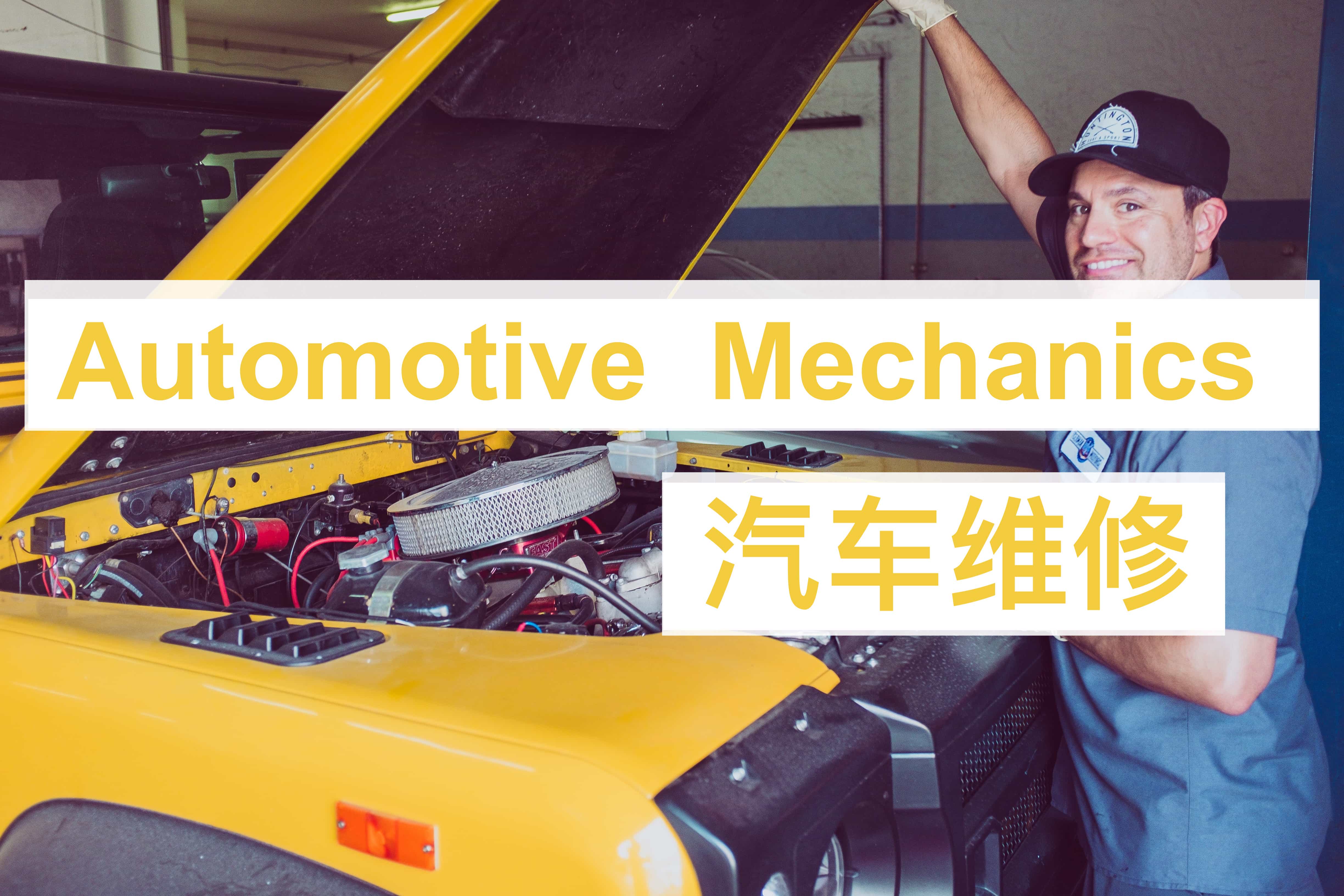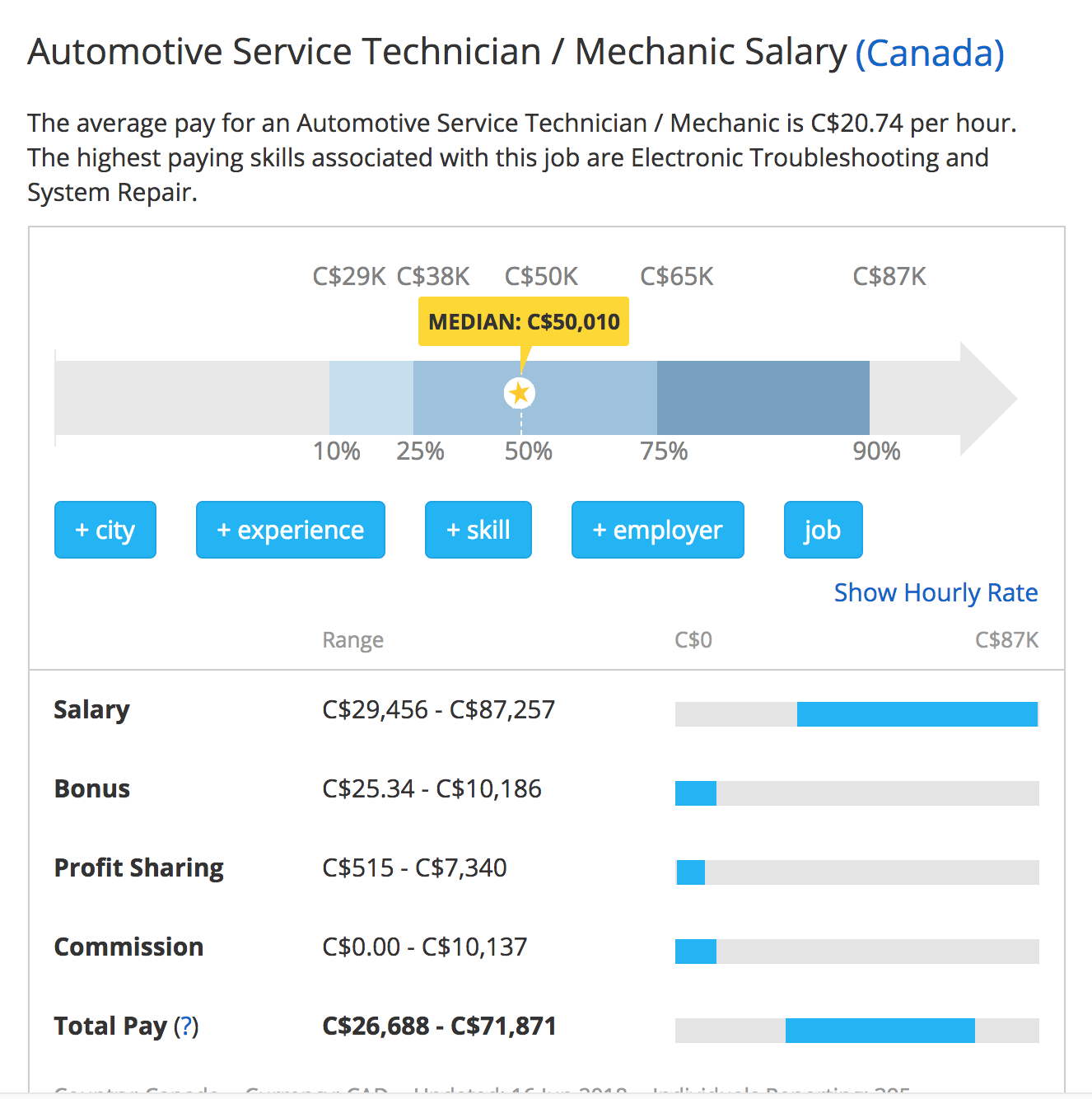[Introduction] When a mechanic opens the hood of a car, he/she sees something very different: a well-designed jigsaw puzzle, when pieced-together correctly, it becomes a means of transportation that can change the life of humans. This article covers the courses in the automotive service major, admission requirements, employment prospects, and the opinions of top-ranked schools and netizens.

Introduction to the Canadian automotive mechanic and repair major
The auto repair profession has different names in different schools. Some schools call it automotive mechanics; some may refer to them as automotive repair programs. The reason is that a"car mechanic"has many names in English too, such as:
- Automotive Service Technicians
- Automotive Repair Technicians
- Automotive Mechanics
- Motor Vehicle Mechanics
- Motor Vehicle Service Technicians
However people refer to it, courses in Ontario college mechanic and repair programs (also known as “automotive service technician” programs) equip students with technical and theoretical information, and then allow them to apply their knowledge in simulated automotive workshops.
》Curriculum for the auto repair major
The courses are offered in the form of a one-year certificate or a two-year diploma course, aiming to make students better employed. In general, this may include diagnosis, repair or installation of the following:
- Engines
- Suspension and braking system
- Body and trim
- Fuel technology
- Electronics and emissions
Note: Some Ontario college automotive mechanic and repair programs require that you be employed by a company under which you can apprentice before you start the in-class component. In addition, as electric vehicles become more popular (and will eventually replace fuel vehicles), schools will also start teaching about car batteries, autonomous driving equipment, and electric vehicle software.
Related articles of the engineering major:
Employment prospects for Canadian auto mechanic graduates
With more than 24 million registered cars on Canadian roads today, there will always be a demand for skilled technicians to repair and maintain these vehicles. Through professional training in automotive schools and colleges, you can develop the required expertise and skills in this dynamic field. In short, automotive industry professionals are in great demand.
In addition to good stable pay, auto technicians enjoy many benefits, including paid tuition, free maintenance of their family vehicles, and skills that can be transferred to do-it-yourself projects (plumbing, electrical) around the home.
So, in addition to auto repair shops, where can these graduates work?
- Car and truck dealers
- Auto parts stores
- High-performance auto shops
- Companies and organizations with their own team
- Racing teams
- Car recycling stations
Every job has its advantages and disadvantages. For example, a dealership may be a good place to start a career, but they often cannot provide the extensive experience comparable to an auto repair shop. After gaining a wealth of experience and business knowledge, some auto mechanics choose to open their own auto shops.
Determinants of income of auto mechanic graduates & income statistics
After an auto repair technician graduates, and after having several years of development, their income levels can vary upon:
- Education level, experience and certifications
- Level of responsibility involved in the work
- The size and type of company
- The location where you work
- Industry
- Type of compensation package offer
- Many other factors, such as English proficiency
According toPayScale Statistics, The annual salary of a car mechanic in Canada is C$29,456-C$87,257 Canadian.

The province and location of work is an important factor. The provinces in Western Canada tend to have the highest average wage rates (for example, Alberta and British Columbia have the highest mechanical wages).
Another thing to note about salaries in the automotive industry is that certain companies’ salaries are not always paid by the hour. Many repair shops operate a salary structure based on "parts work", which means that mechanics pay a flat rate for every maintenance or repair work they perform. As a result, staying busy and speeding up work can make you more money.
Most car mechanics usually work about 40 hours from Monday to Friday. However, wages are also affected by overtime hours.
》Job description of an auto mechanic
Automobile technology continues to develop rapidly. With all the ongoing changes, today's mechanics have to learn more than you think. Let us take a look at what auto maintenance mechanics are doing in a typical day, and you will know what to learn in this profession.
In general, auto mechanics perform the following tasks:
》》Inspection and troubleshooting:
- Check the vehicle engine and system through sight, sound and smell to determine whether the vehicle has any signs of failure, or verify the extent of any damage
- Diagnose malfunctions using electronic testing equipment
- Test vehicles to diagnose, repair and perform maintenance on automobiles; or verify the quality of maintenance work
》》Consultation and regular maintenance:
- Consult with owners about necessary maintenance or repairs
- Estimate maintenance time and cost
- Perform oil changes, coolant flushing, spark plug replacements, lubrication, wheel alignment, tire rotation, and many other routine maintenance tasks
》》Maintenance:
- Replace worn or damaged parts
- Perform necessary repairs to engines, electrical systems, transmissions, exhaust systems, steering systems, transmissions, fuel systems, brakes and other automotive systems
- Remove and rebuild the engine, powertrain, or other subcomponents as needed
》》Administrative Tasks:
- To order parts
- Assist in inventory management
》Three types of automobile-related qualifications: college diploma, undergraduate degree, graduate degree
Traditionally, Canadian automotive repair credentials are obtained in three ways:
- Automotive Service Specialist Diploma:generally 2-3 years
- Automotive Engineering Bachelor’s Degree:generally takes 4 years to complete
- Automotive Engineering Graduate Degree:generally 2 years to complete (a master's degree usually requires an additional 2 years of study)
The best schools for Automotive Service
According toMacLean's latest program rankings of Canadian universities, the rankings of engineering programs are as follows:
1、University of Toronto (Engineering major)
2、University of Waterloo(Engineering major)
3、UBC(Engineering major)
4、University of Alberta(Engineering major)
5、McGill University(Engineering major)
6、University of Ottawa(Engineering major)
7、 Queen’s University(Engineering major)
8、Université de Montréal(University of Montreal Engineering major)
9、McMaster University(Engineering major)
10、University of Calgary (Engineering major )
11、University of Victoria (Engineering major)
12、Université Laval (Laval University - French institution)
13、Ryerson University(Ryerson UniversityEngineering major)
14、 University of Saskatchewan(University of SaskatchewanEngineering major)
15、Western University (Engineering major )
16、York University (Engineering major)
17、Dalhousie University (Dalhousie UniversityEngineering major)
18、Lakehead University (Engineering major)
19、Simon Fraser University(Engineering major)
20、Concordia University(Engineering major)
20、University of Ontario Institute of Technology (Engineering major)
* Special recommendations:
University of Windsor: Windsoar Universityis the southernmost public university in Canada. It is located in the Great Lakes area along the US-Canada border, in the industrial heart of North America, across the lake from Detroit, the American "Motor City." It is known for its automotive engineering major. It is also the only university in Canada that awards bachelor's, master's and doctor's degrees in automotive engineering.
Summary: UtoCanada's views on the auto mechanic major
Since vehicles became a part of ordinary American families in the 1920s, the auto repair industry has begun to grow.
Speaking of vehicles, an important fact is that we are standing at the verge of the times. There are three technologies that will bring drastic changes to mobility within the next 20 years: passenger drones, electric vehicles, and autonomous vehicles. Combining the predictions of several experts (see the original text at the bottom of this article), here’s our opinion:
》Do electric vehicles have an impact on the auto repair industry?
Everyone knows that there are limited oil reserves on the earth, and electric vehicles are an inevitable choice in the future. Although the development of electric vehicles is still stuck in the battery performance stages, the world is ushering the rising revolution of electric vehicles. As represented by China (which accounted for 40% of global electric vehicle sales in 2016), many developed and developing countries are making preparations. According to the prediction ofIHS Markitelectric vehicles will account for 40% of new car sales worldwide in 2040. Can you imagine how rapid the development of electric vehicles will be after the battery problems are solved?
Can you imagine how rapid the development of electric vehicles will be after the battery problems are solved?
The problem is that the structure and working principle of electric vehicles are different from traditional fuel engines. Will the major be useful then?
In fact, the influx of electric vehicles will not eliminate the demand for auto repair services, but only requires auto repair technicians to keep up with the times and about electric vehicles. It is worth noting, however, that according to theintroduction of Chicago Tribune, electric vehicles require much less maintenance than traditional fuel vehicles, so many people predict that the demand for auto repair technicians will be greatly reduced.
》Do autonomous vehicles have an impact on the auto repair industry?
As technology giants like Baidu, Google, and Tesla continue to spend heavily on self-driving technology, it is only a matter of time before drivers are completely replaced. An important fact is that autonomous vehicles will greatly reduce the number of accidents. We all know that the main source business for auto repairs cars comes from car accidents caused by human error. With fewer accidents, will auto repair shops eventually disappear?
In reality, self-driving cars are still built with many current components that are used now. Brakes and tires will still wear, wiper blades still need to be replaced, and electrical systems still need to be diagnosed, maintained and repaired; all of which require the hardworking mind and hands of skilled technicians. Repairs due to traffic accidents will definitely decrease, but mechanics will still have jobs.
Not only that, self-driving vehicles will create new jobs. Just like the emergence of factory automation, the talent market demanded for a large number of programmers and robot maintenance technicians. Self-riving cars will create a whole new field of technical work, and modern automotive technicians are already learning and adapting to these new technologies.
Reference article:
https://www.ontariocolleges.ca/en/programs/transportation-and-logistics/automotive-mechanic-repair
https://www.jobpostings.ca/career-guides/automotive/demand-auto-mechanics-rising
http://www.autonews.com/article/20160215/RETAIL05/302159940/dealership-policies-worsen—and-can-relieve—a-shortage-of-mechanics
http://knowhow.napaonline.com/will-autonomous-vehicles-really-make-mechanics-obsolete/
http://www.chicagotribune.com/bluesky/technology/ct-electric-vehicles-auto-mechanic-20171211-story.html
https://www.marketplace.org/2017/08/24/sustainability/whats-mechanic-do-when-electric-cars-bring-less-work















